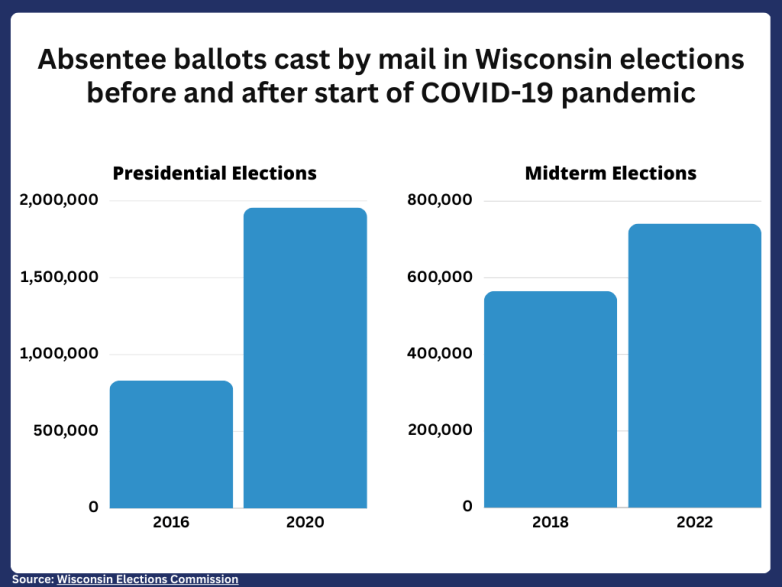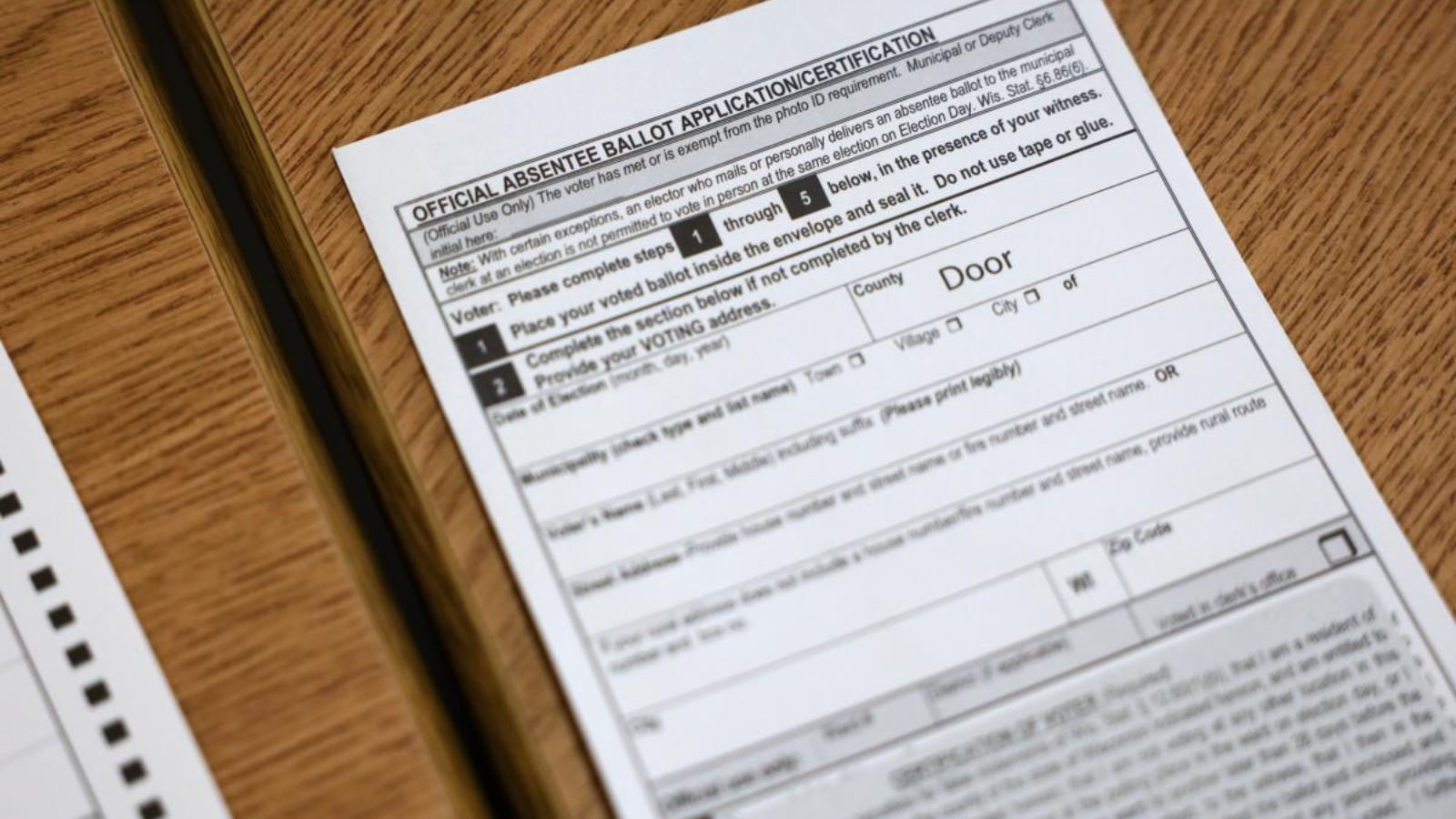Forward is a look ahead at the week in Wisconsin government and politics from the Wisconsin Watch statehouse team. Here’s what to watch this week.
When you write an address, what information do you include? House or apartment number? Street name? Municipality? State? Zip code? All of these things? Just some of them?
Lawmakers on the GOP-controlled Assembly Committee on Campaigns and Elections are scheduled to hear testimony Wednesday on legislation that would require a witness to include all of those things — plus a printed first and last name and signature — on an absentee ballot envelope in order for it to be counted. A spokesperson for Sen. Dan Knodl, R-Germantown, who chairs the Senate Committee on Shared Revenue, Elections and Consumer Protection, told Wisconsin Watch the legislation is on “the tentative committee schedule” for a public hearing, but a meeting notice has not yet been issued.
The legislation comes after a Dane County judge issued an injunction last week in a case in which he earlier determined an address, for the purposes of the witness address requirement on an absentee ballot certificate, is “a place where the witness may be communicated with.” That means that as long as clerks can discern where the witness who signs an envelope lives, they can count the ballot.
In Wisconsin, anyone can vote via an absentee ballot. But under state law, for an absentee ballot to be accepted, its envelope must be signed by a witness and include the witness’ printed first and last name and address — but the definition of address is not specified.
If you’re wondering why this hairsplitting over what constitutes an address matters, consider this: In 2022’s midterm elections, more than 740,000 Wisconsinites voted via a mailed absentee ballot, according to Wisconsin Elections Commission data. In 2020, fueled by the COVID-19 pandemic, almost 2 million Wisconsinites cast a ballot via mail.
In a state where elections — at both the state and local level — are decided by narrow margins, determining which ballots can be counted could influence election outcomes.
For 31 elections, clerks operated under WEC guidance that said an address consisted of “a street number, street name, and the name of the municipality.” The same guidance also said a clerk could fill in — or “cure” — missing information if a witness’ address did not have all three pieces. A Waukesha County judge ruled in 2022 that election clerks could no longer correct or fill in missing witness address information, meaning clerks had to return incomplete absentee ballots to voters for correction — something that can be difficult if there are only a few days left before an election.

Judge Ryan Nilsestuen’s order from last week will give clerks more flexibility on determining which ballots they can count. He also ordered the WEC to rescind — or revise and reissue — guidance outlining the definition of address. The GOP-controlled Legislature, which intervened in the lawsuit, appealed the judge’s decision to the District 4 Court of Appeals in Madison. Nilsestuen declined last week to stay his order pending appeal.
“The problem at hand could be resolved if the Legislature passed a bill to define ‘address,’” Nilsestuen noted in his ruling.
Republican lawmakers said they are willing to do just that.
“We are more than happy to take the advice of Judge Nilsestuen and pass such a bill to define exactly what an address is so that there are no longer any questions regarding what must be present in the witness address portion of an absentee ballot envelope,” the Republican bill authors wrote in a co-sponsorship memo.
A spokesperson for Democratic Gov. Tony Evers told Wisconsin Watch the governor “believes we should be making it easier, not harder, for eligible Wisconsinites to cast their ballot,” but did not say directly whether the governor would veto the bill.
Rep. Clinton Anderson, D-Beloit, who serves on the elections committee, expressed concerns that strict requirements would prevent some ballots from being counted.
“If a ZIP code’s keeping somebody from voting, that’s a huge issue,” he told Wisconsin Watch in an interview. “We want to make sure people have the right to vote, and an honest mistake should not deny somebody’s right to vote. I trust our county and city clerks to do the right thing.”
What we’re watching this week
Tuesday
🪪 The Joint Committee on Legislative Audit will hold a public hearing at 1:30 p.m. in Capitol Room 412E on the Department of Safety and Professional Services audit, which found the average number of days it took to issue credentials dropped considerably in 2022-23 from previous years, but improvements can still be made. Read our previous coverage here.
Wednesday
✉️ The Assembly Committee on Campaigns and Elections will hold a public hearing at 10 a.m. in Capitol Room 300NE on AB1037, which would define what constitutes an “address” for the purposes of an absentee ballot certificate.
🔋 The Assembly Committee on Energy and Utilities and the Senate Committee on Utilities and Technology will hold a joint informational hearing at 10 a.m. in Capitol Room 328NW on the “Evolution of Energy” in Wisconsin.
📚 The Assembly Committee on Education will hold a public hearing at 10:01 a.m. in Capitol Room 300 NE on AB 1035, which would require school districts that provide a 4-year-old kindergarten program to coordinate the program with community-based child care providers and exempt those providers’ employees from having to be licensed teachers.
Thursday
🗳️ The Wisconsin Elections Commission will meet at 10 a.m. for its quarterly meeting. Watch on Wisconsin Eye.
⚖️ Responses to a report from the Wisconsin Supreme Court’s redistricting consultants are due by 5 p.m. All parties involved in the case and some outside groups are invited to file responses.
This article first appeared on Wisconsin Watch and is republished here under a Creative Commons license.![]()
More Articles
Civic Media’s “Truth Booth” to Capture the Voices of Wausau at the Fair
7/26/2024 | Teri Barr
Local residents can share their stories about life in the Wausau area and record them for posterity during the Wisconsin Valley Fair.
Eight Area School Districts Receive $206K for Technical Education Upgrades
7/26/2024 | Stuart J. Wattles
The funding aims to prepare approximately 2,000 students for quality jobs
Eau Claire Officials Respond to Removal of Wilson Park Benches
7/26/2024 | James Kelly
Eau Claire City Council members are asking questions this week after all of the benches and picnic tables were removed from Wilson Park.
Aviation enthusiasts flock to EAA AirVenture
7/26/2024 | Lisa M. Hale
People from all over the globe are a part of the largest fly-in in the world, EAA AirVenture 2024.
8th Congressional District Republican candidates debate
7/26/2024 | Lisa M. Hale
-The Republican candidates in the 8th Congressional District race participated in a debate sponsored by the Wisconsin Manufacturer’s & Commerce (WMC). The WMC is the combined state chamber and manufacturer’s association.

